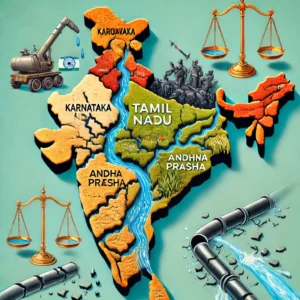Inter-state water disputes in India

Water is a key resource that is required for both life and economic activity. Water disputes between states are a major concern in India, as rivers are vital to agriculture, industry, and everyday life. The country has witnessed multiple long-running legal battles over the distribution and management of river flows, the most notable of which are the Cauvery and Krishna river disputes. These conflicts are frequently caused by historical claims, geographical imbalances, and varied requirements among the states involved, resulting in significant legal and political issues.
Historical Context of Water Disputes in India
India’s federal system is made up of states with diverse geographical and climatic characteristics. Some states have ample water resources, while others experience chronic water scarcity. The uneven distribution of water resources has long been a cause of concern. When rivers cross state lines, the subject of water distribution becomes much more complex. The Indian Constitution offers a mechanism for resolving these issues, allowing states to approach the Supreme Court or request the involvement of the Central Government. The Interstate River Water Disputes Act of 1956 was passed to settle such disputes, resulting in the formation of tribunals to arbitrate the issues.
The Cauvery River Dispute
One of India’s most controversial interstate water disputes is the Cauvery River conflict, which involves the states of Karnataka, Tamil Nadu, Kerala, and the Union Territory of Puducherry. The Cauvery River begins in Karnataka and travels through Tamil Nadu before entering the Bay of Bengal. The issue stretches back to the nineteenth century, when the then-Madras Presidency (now Tamil Nadu) and the princely state of Mysore (now Karnataka) agreed to share water resources.
The conflict worsened after independence as both Karnataka and Tamil Nadu built their irrigation systems, increasing demand for Cauvery waters. Tamil Nadu, as the lower riparian state, has historically relied on the Cauvery for agricultural purposes, notably in the fertile delta region. However, Karnataka claims that it must satisfy the water needs of its expanding population and irrigation projects.
Over the years, there have been multiple rounds of negotiations, legal fights, and the founding of the Cauvery Water Disputes Tribunal in 1990. Both states opposed the tribunal’s ultimate ruling in 2007, resulting in further litigation. In 2018, the Supreme Court issued its decision, marginally amending the tribunal’s order and granting a larger share of the water to Karnataka. However, the conflict remains a delicate topic, with tensions between the states escalating during monsoon seasons or when water supplies is limited.
The U.S. Judicial System: How It Works and Its Impact on Society
The Krishna River Dispute
Another notable water issue is the Krishna River dispute, which involves Maharashtra, Karnataka, Andhra Pradesh, and Telangana. The Krishna River, one of India’s longest rivers, starts in Maharashtra and travels through Karnataka, Telangana, and Andhra Pradesh before emptying into the Bay of Bengal.
The conflict over Krishna’s waters stretches back to the 1950s, when the states involved started building dams and irrigation projects. The Krishna Water Disputes Tribunal (KWDT) was established in 1969 to resolve the issue. The panel issued its award in 1976, and it was later reviewed and updated in 2010.
The establishment of Telangana as a separate state in 2014 added another layer to the conflict, necessitating a reassessment of water allocations. Telangana, as the upstream state, has wanted a larger share of Krishna water to meet its agriculture and drinking water requirements. Andhra Pradesh, on the other hand, has pushed for the preservation of its historical share, stressing its reliance on the river for agriculture.
The ongoing legal disputes over the Krishna River have resulted in a complicated network of discussions, tribunal interventions, and court proceedings. The states continue to fight over allocations, especially during years of drought or insufficient rainfall, when water scarcity exacerbates the conflict.
Legal and Political Implications
In India, interstate water disputes are more than just legal skirmishes; they have far-reaching political and societal consequences. Water is a highly sensitive issue, and any perceived injustice in its distribution can cause public outrage, riots, and political turbulence. State governments are frequently pressured to maintain their water rights, which leads to conflict with neighboring states.
Legal processes, notably tribunals and the Supreme Court, have been critical in resolving these conflicts. However, implementing tribunal rulings and court verdicts remains difficult since states may refuse to comply owing to political considerations.
Conclusion
The ongoing judicial battles over water sharing and management, such as the Cauvery and Krishna river conflicts, underscore the complexity of interstate relations under India’s federal framework. As population expansion and climate change make water shortage a more significant concern, cooperative and sustainable water management strategies become increasingly important. While legal frameworks and judicial interventions are required, developing inter-state cooperation and discourse is critical to ensure equitable and peaceful water sharing in the country.
Do Follow http://www.khabartaak.com
Pingback: Crude Oil's Decline in the Stock Market: Causes, Implications, and Future Outlook -